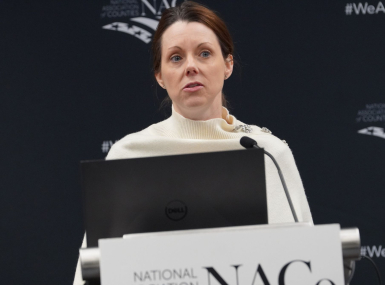Administration issues order delegating refugee admission decisions to states and localities
Upcoming Events
Related News

Key Takeaways
On September 26, the White House issued an executive order (EO) delegating states and localities the authority to reject or accept refugees from settling in areas based on the availability of local resources.
Under the directive, the U.S. Secretaries of State and Health and Human Services (HHS) have 90 days to implement a process to determine whether states and localities consent to the resettlement of refugees in jurisdictions before relocating refugees to those communities. If the state or local government does not provide consent, then the refugees would be resettled in a state or locality agreeing to receive those individuals.
The EO follows administrative action to scale back the U.S. refugee program from 30,000 refugees in FY 2019 to 18,000 in FY 2020. Of those 18,000, the U.S. will accept up to 5,000 refugees fleeing religious persecution, 4,000 Iraqis who assisted the U.S. government or who have other ties to the U.S., and 1,500 from Guatemala, El Salvador and Honduras. Beyond these categories, the U.S. will accept up to 7,500 additional refugees to the country.
Given the critical role county governments play in carrying out federal immigration policy, counties encourage federal agencies of jurisdictions to collaborate with localities to establish clear protocols for the refugee resettlement process. NACo will continue engaging with our federal partners to ensure county interests are included in policymaking around refugee and immigration issues.
For more NACo resources, please see the following links:
- County officials tour border, see immigration practices firsthand (NACo County News)
- Immigration at the Local Level: How Counties Can Use Workforce and Adult Education Policy to Strengthen Inclusion (NACo webinar presented in partnership with the National Skills Coalition)
- A Call for Clarity and Compromise: The Perspectives of State and Local Officials on the National Immigration Debate (NACo policy briefing)

Attachments
Related News

National Association of Counties Launches Initiative to Strengthen County Human Services Systems
The National Association of Counties (NACo) announces the launch of the Transforming Human Services Initiative, a new effort to help counties modernize benefits administration, integrate service delivery systems and strengthen county capacity to fulfill our responsibility as America’s safety net for children and families.

Congress seeking ‘common-sense solutions’ to unmet mental health needs
Rep. Andrea Salinas (D-Ore.): “Right now, it is too difficult to access providers … and get mental health care in a facility that is the right size and also the appropriate acuity level to meet patients’ needs.”

Federal-level child welfare priorities center on supporting foster youth, families
Child welfare experts outlined current priorities at the federal level, including better supporting foster care youth who age out of the system and recruiting more foster parents, at NACo’s Human Services and Education Policy Steering Committee meeting.